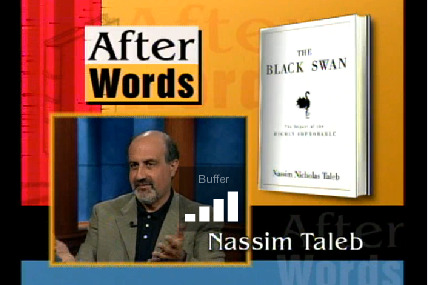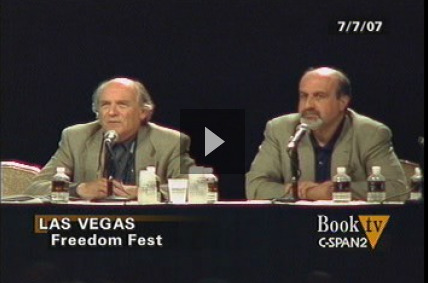Shared by JohnH
HatTip to Dave Lull
By Mark Edmonds
http://www.thesundaytimes.co.uk/sto/Magazine/Regulars/article487481.ece
Nassim Nicholas Taleb, author; The world’s fastest interview: 140 characters max per answer. The “world’s hottest thinker” on castigating bankers and pessimism about global recovery
Mark Edmonds. Sunday Times. London (UK): Jan 2, 2011. pg. 11
Copyright (c) Times Newspapers Limited 2011
Witter: What’s happening? And I’m not looking for aphorisms or apercu.
NT: I’m drinking coffee and playing with graphs for my new book.
Witter: Do you regard yourself as one of the most intelligent people on the planet?
NT: No. But I define intelligence as asking the right questions, looking at important matters, not solving complicated combinatorics.
Witter: Combinatorics? Might need help here.
NT: Replace combinatorics with quizzes. I think I understand the limitations of my understanding better than others we tend to call intelligent.
Witter: Can you think of a single universal aphorism for our time?
NT: We will never be safe until we accept that traditions (and heuristics) know things we don’t.
Witter: You’ve been criticised for castigating bankers. Isn’t it time that you left them alone?
NT: I would leave bankers alone when you leave the mafia and other forms of organised crime alone.
Witter: Are you still pessimistic about global recovery?
NT: The problem is not recovery, but the presence of risks in the system.
Witter: You referring to the banks?
NT: Not just the banks, but publicly listed companies with managers’ options. The markets lost 20% to 50% of their value in the past decade.
Witter: Your new book reveals you to be a know-all.
Kindly assure me otherwise.
NT: The aphorisms in it correspond to people making an assumption about things and getting it backwards.
Witter: Have you been in touch with David Cameron since he took office?
NT: Yes. I hope to see him in February.
Witter: What will you tell him?
NT: To have courage; it is what modern politicians seem to lack.
Witter: What do you do for fun?
NT: In natural habitats everything should be fun. No distinction between work and play.
Witter: You’ve done rather well out of the meltdown, haven’t you? Isn’t it crass to cash in?
NT: I find it immoral to produce a forecast unless you have something at risk.


